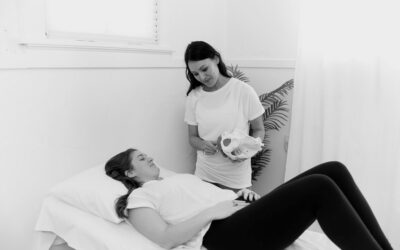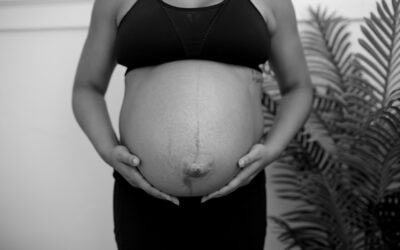When you can start having sex again after pregnancy and childbirth?
Most women wait until after their 6-week physician check up to get the okay to return to intercourse. Some women may want to start having sex sooner than that. I do encourage you to let your body heal during this time. Because when you try it again for the first time, it might be painful.
Many women experience painful sex postpartum. Painful sex, also called dyspareunia, is common in the first 3-6 months after childbirth. 55% of women experience pain with penetration which can persist beyond 12 months postpartum for some.
Many women feel pain during sex after giving birth. They should receive counseling on how to have sex after childbirth. Risk factors for painful sex include breastfeeding, perineal tear, perineal pain, fatigue and stress.
Why Painful Sex Postpartum Might Occur
Remember – postpartum sex pain is a common, often distressing experience. It can occur because of:
- Vaginal dryness
- Decreased lubrication
- Reduced elasticity of the vaginal muscles and tissue because of childbirth
- Scar tissue or tearing in the perineum
- Psychological factors such as fear, anxiety, trauma, the baby blues and postpartum depression
It Takes Time to Heal Postpartum
After pregnancy, labor, childbirth and nursing, our bodies often are not the same. This goes for our vaginas and pelvic organs, too! Leaky boobs, saggy skin, stretch marks, weight gain, and a more relaxed vagina.
Hello, postpartum body issues! You may never get to the point of viewing your new body as a badge of honor of motherhood.
You should still take some time to allow it to recover and to accept some of the changes in this new season of life. Talking to other moms, staying active, and returning to an exercise routine can help.
When it’s Safe to Return to Sex
Here are some common factors that determine when it is a comfortable time to return to sex:
- Vaginal bleeding has stopped.
- Scar tissue from an episiotomy or tear has healed.
- When you feel ready
Be patient with your body and don’t push through any pain. Learn how to perform gentle scar massage on the area starting 6 weeks after your delivery. This can help soften the tissue and promote faster healing. Consulting a pelvic floor physical therapist for advice can help.
Tips for Returning to Sex After Giving Birth
Check your perineal scar
At least 70% of women who have a vaginal birth experience a perineal tear. This often results in a laceration, which can take up to 12 weeks to adequately heal.
After giving birth, women usually have a checkup about 6 weeks postpartum. At this appointment, the doctor may say it’s okay to have sex again. However, women may be at risk for injury, infection, and pain if wounds do not heal by this time.
The more severe tear, the higher risk of insertional pain with sex. Additional risk factors for painful sex include breastfeeding, perineal pain, fatigue and stress.
Perform perineal massage once your scar has completely healed, typically between 8-12 weeks and after cleared by your physician. If you are experiencing painful bleeding, it is important to inform your doctor. This could indicate that your scar has not fully healed or that there is granulation tissue present.
Check your c-section scar
C-section scars can often be the culprit of painful sex after childbirth. Yes, even if you did not have a vaginal delivery. The vaginal muscles have decreased blood flow and may get tense causing pain with sex.
A pelvic floor physical therapist can do an external and internal massage. This will help the postpartum pelvic floor muscles relax and improve blood flow.
What can you do at home?
Use vaginal dilators! They look like tampons of different sizes. This will help retrain the vaginal wall muscles to relax. This will also promote blood flow to help decrease pain.
Lube up if you have painful sex postpartum
Pain can occur during postpartum sexual activities because your vagina is dry. Estrogen levels may not have returned to normal yet.
This is especially true if you are nursing or pumping. Nursing and pumping can cause vaginal tissue to be thin, dry, and prone to tearing.
Use a water based lubricant or natural oil like coconut oil (and lots of it!) during intercourse to help decrease friction. Staying hydrated and performing gentle kegel exercises can help promote blood flow.
Be patient
Returning to your pre-baby sex life? You may think – “No, thanks!”
That’s okay. You may have no sex drive. This is normal.
Exhaustion, irritability, hormonal, and in desperate need of a shower are a few things you need. Doing your partner a solid by getting busy is low on the list of priorities.
Don’t push yourself to do something you don’t feel ready for. Do try to take small steps to stay connected with your partner.
Explore yourself first
You want postpartum sex to feel good! Rediscover what feels good for you by exploring yourself solo first. Your sexual health is important and this could be a good first step. Masturbation can help build your confidence and get you in touch with your body again before having sex with a partner.
Find intimacy in other ways
A frequent complaint from new moms is they often feel lonely and less connected.
Being intimate is a great way to connect. This can entail having intercourse. That can be anything from holding hands or cuddling to other forms of foreplay or fondling.
If you’re feeling overwhelmed or scared, talking to your partner can help. Communicating how you feel and what your expectations will ensure that both of you are on the same page. You can also talk to a therapist if needed.
The takeaway here is to be patient with yourself and your body as it heals.
You should return to sex at the pace that is comfortable for you. And remember, painful intercourse is NOT normal. Talk to your doc and request to see a pelvic physical therapist if needed. Physical therapy can help guide you on the path to pain-free and enjoyable sex.




